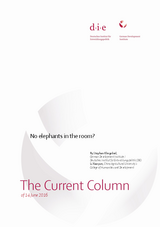No elephants in the room?
Klingebiel, Stephan / Li XiaoyunThe Current Column (2016)
Bonn: German Development Institute / Deutsches Institut für Entwicklungspolitik (DIE) (Die aktuelle Kolumne vom 14.06.2016)
Bonn, 14 June 2016. Surprisingly, reports and even opinion pieces on the first high-level meeting of the Global Partnership for Effective Development Cooperation (GPEDC) – the main forum for debates on development cooperation – in Mexico City in 2014 ignored one basic fact: Main stakeholders of the partnership did not show up (China and India) or were present just as an observer (Brazil). Some others (like South Africa) joined the meeting but seemed to have clear reservations as well. Against this background, the Mexico meeting was only partly successful since an inclusive and more legitimate basis of the Global Partnership was the main rationale to transform the former aid effectiveness platform organized by the respective working group of the OECD (Organisation for Economic Co-operation and Development) into a quite new format which is jointly driven by the United Nations Development Program (UNDP) and the OECD. We are now approaching the second high-level meeting of the platform, which will take place from 28 November to 1 December 2016 in Nairobi, Kenya. So, how did the context change since the Mexico meeting? What is on the agenda for Nairobi? Are we going to see all ‘big elephants’ in the conference hall? Changing context In basic terms, two aspects need to be highlighted. Firstly, the 2030 Agenda for Sustainable Development is now providing an important narrative on global development. The potential of this narrative goes well beyond the Millennium Development Goals and their traditional focus on developing regions: All main stakeholders accept the universal nature of the 2030 Agenda, which provides a strong legitimacy. The 2030 Agenda is at the core of major efforts including development cooperation platforms like the GPEDC, the United Nations Development Cooperation Forum (DCF) and activities under the umbrella of the OECD. From a development cooperation perspective, the 2030 Agenda has advantages and disadvantages at the same time: ‘Development’ is not any longer a challenge just for ‘developing regions’ but for all countries of the world. This leads to more vagueness in terms of responsibilities. Thus, development cooperation actors are struggling with the question: How to adjust to the new agenda? Who is in charge for the follow-up and the monitoring? Secondly, important rising powers are still pushing for a concept for South-South-Cooperation (SSC) which is distinctive from the OECD aid approach. This, for example, became tangible during the second global conference on SSC hosted by India in March 2016. However, contours and criteria are evolving but remain quite vague. Individual countries like China will use the 2030 Agenda to guide their SSC. Harmonisation on SSC still to needs be pushed for. The different approaches of rising powers to the GPEDC point to this challenge as well. Why to care about GPEDC? Is the changing context leading to different views of rising powers on the GPEDC? Our assumption is that a partial membership to the Global Partnership high-level meeting remains likely. Participation in this forum seems to still not be a high priority for all rising powers and different perceptions on the legitimacy of the platform might continue to exist. Against this backdrop we propose to reflect on three aspects: First, all stakeholders – rising powers, OECD countries, recipients of SSC and development cooperation – should reflect on a truly ‘global’ cost-benefit analysis of participation and non-participation in the GPEDC. Second, rising powers should be more explicit about requirements for such a global platform. What is needed and how can we use or further develop an existing mechanism? Third, Kenya as the upcoming host country for the High Level Meeting of the GPEDC and other steering committee members should come up with new initiatives and brainstorm with rising power government and non-governmental representatives about a restart of the ‘global spirit’ of the GPEDC. In our view the international community is in need of a well functioning platform which should cover all aspects of development cooperation and SSC. We do not assume that all countries can agree on standards and norms in all areas. However, the need for a joint dialogue platform is striking. Stephan Klingebiel is Head of the Department Bi- and Multilateral Development Cooperation at the German Development Institute / Deutsches Institut for Entwicklungspolitik (DIE), a regular Visiting Professor at Stanford University and a Senior Lecturer at the Philipps University Marburg. Li Xiaoyun is a professor and former dean of China Agricultural University’s College of Humanities and Development, president of the China International Development Research Network (CIDRN) and chairman of the Network of Southern Think-Tanks (NeST).


